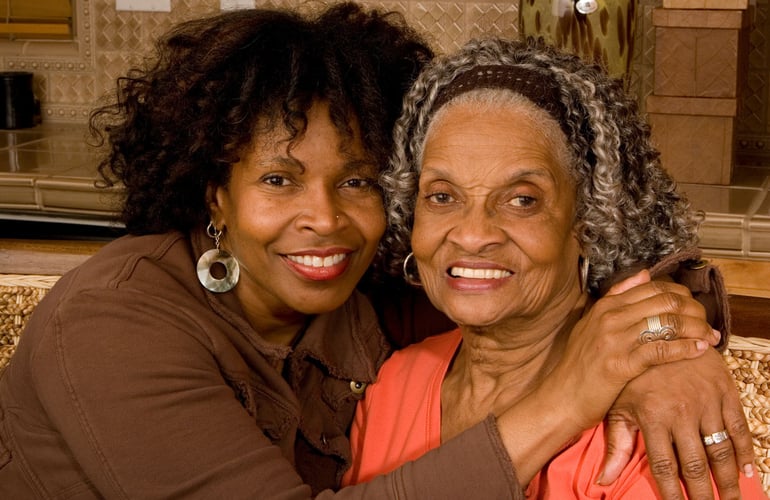
People who are living with Alzheimer’s disease and other forms of dementia are suffering in silence, along with their caregivers, because of the embarrassment surrounding the disorders.
But some people, including Dr. Christian Gausvik, a Cincinnati-based family medicine, and geriatrics physician, and Shannon Braun, director of ERS’ Center for Memory Support and Inclusion, are working to change that.
Much of the solution is dragging the disease out of the shadows and eliminating some of the stigma attached to it. In contrast to one misperception, for example, people with early stages of dementia usually can work productively and with clarity, with only occasional memory glitches.
Pulling dementia into the light
There are two sides to what creates the shadows surrounding dementia. On the one hand, people with the disorder are embarrassed to have their diagnosis known because others might consider them less competent. On the other, friends and those who know the person with dementia have a fear of it: They’re not sure what to expect when interacting with someone who has dementia and are afraid they may do something inappropriate.
Gausvik, who founded the Giving Voice Foundation to battle the stigma, says one key to reducing the embarrassment connected with dementia is to help people better understand the disease and how to communicate with someone who has it.
“I think for some people, it’s just how do you interact with someone with dementia?” he said. Gausvik said people wonder, “What can I expect? Are they going to say something weird? Am I going to feel uncomfortable? Am I going to say the wrong thing?”
“I think that’s a lot of the doubts that go through people’s minds. So, equipping people with the answers to some of those questions that they wonder about, I think, is helpful.”
Not a ‘casserole disease.’
Braun said it's unfortunate dementia is not a ‘casserole disease’ — the kind where, when people learn you have it, they show up to help with dinners they’ve made for you or other forms of kindness for the family and caregiver.
A man with dementia whom Braun recently heard speak said his diagnosis of dementia was similar to what happened to him after he was divorced: People immediately fell away from friendship with him.
For friends of someone with a dementia diagnosis, “I think there’s a lot of fear of cognitive loss and being around it,” Braun said. “It makes you think of your own mortality and your own desire to keep your cognition through your life. So it can be really uncomfortable for people.”
That’s unfortunate because this is a time when people living with dementia and their caregivers can most benefit from friendships as they become more isolated – and enter a mourning period because of the disease.
Break through the discomfort.
Both Braun and Gausvik hope people who learn that friends or acquaintances have dementia will educate themselves about the disease and then break through the discomfort to work harder on their friendship.
 “Something I have found that’s really helpful for care partners – or, for couples struggling with dementia – is that still having other couples to go out to dinner with, it just breaks up the monotony of it just being one-on-one all the time, and you kind of need that,” Braun said.
“Something I have found that’s really helpful for care partners – or, for couples struggling with dementia – is that still having other couples to go out to dinner with, it just breaks up the monotony of it just being one-on-one all the time, and you kind of need that,” Braun said.
Friends of people with dementia have to adjust to the new reality. For example, it may take the person longer to process questions and then answer them.
“It’s not going to be as easy-breezy as it has been in the past, and you just have to know that ahead of time, and be comfortable with it,” Braun said.
But a key to remember is: “This is your friend, and the friendship doesn’t end just because change is happening in the brain,” she said.
Gausvik expresses a similar hope for those with dementia and their caregivers. He says people should make extra efforts to help their friends struggling with the disease and loneliness.
“I understand that if you take someone who has moderate dementia out to a restaurant, there can sometimes be some uncomfortable situations that arise,” he said. “So I definitely understand people’s hesitation.”
Yet, he added, “I think it’s on the rest of us to do our best to make sure that we’re making those opportunities still available because as I think about myself, I certainly hope that somebody would do that for me someday.”
Aiming high for dementia inclusion
Shortly after Laura Lamb became ERS’ president and CEO, she told The Cincinnati Enquirer in 2017 she hoped to see Cincinnati become “the most elder-friendly or dementia-friendly community in the country.”
ERS in 2020 created the Center for Memory Support and Inclusion, which has been working with churches and other organizations, like the Giving Voice Foundation and several museums, to educate people about dementia and also provide support for them. The center also has been working with police agencies and museums to train their personnel about dealing with people with dementia in a sensitive way.
“Having felt the stigma of dementia personally when caring for a loved one motivated us to work to make Cincinnati dementia-inclusive,” Lamb said this year about the effort.
Giving Voice Foundation
The Giving Voice Foundation was founded in 2016 as a fundraising effort for dementia support and evolved into a non-profit organization. Its purpose is to provide programming to people living with dementia and their caregivers in the community.
Just as importantly, the foundation also creates opportunities for those families to remain engaged and connected. Social connections are significant because they help slow the progression of dementia.
The foundation offers several programs, including:
- Creative Connections, a music and movement event for those with dementia while their caregivers meet in another room;
- Dancing to Remember, in collaboration with ERS, where those with dementia and their caregivers take easy dance lessons and enjoy time dancing together, with an event after the several-week program where families are invited to share the fun;
- Purposeful Planning, created with support from The Alois Foundation, where newly diagnosed people and their families can learn what to expect from the disease and learn from social workers what resources the community can offer to help them.
- Other Giving Voice Foundation assistance efforts can be found here, under the programs tab.
The Giving Voice Foundation has two annual fundraisers: Mimosas for Memories, which will happen on April 29, 2023, and Cincy Brews for Brains, scheduled for September 21, 2023.
Contact us today to learn more about how living at Marjorie P. Lee can help you or a loved one incorporate these “brain health” components into your own life.












